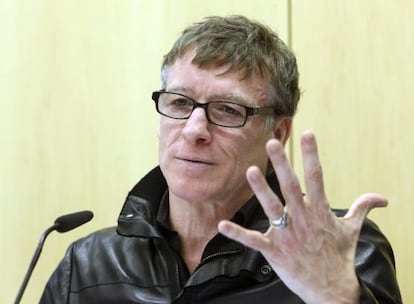Nacho Duato: “Ballet in Spain is like the Sahara desert”
Choreographer who made the Centro Nacional de Danza a world reference to head the Staatsballet

The exquisite world of dance in Germany experienced a brief Spanish parenthesis on Thursday when the Staatsballet, the country’s most important company, formally presented its new artistic director, Nacho Duato.
Although the decision to hire the Spanish choreographer had been made public in February 2013, his arrival in Berlin last week caused a flurry of activity as critics and the media came to hear about his plans for the German dance company beginning in August, when he takes over.
“This could be the best place for my career,” said Duato, 57, who was the longtime director of Spain’s Centro Nacional de Danza (CND) before moving on to Saint Petersburg and the Mikhailovsky Ballet.
“To me, it is a dream to be in Berlin, because the Staatsballet is a great company,” added the former dancer, addressing a packed room inside the Deutsche Oper. “After working in Russia for three years, I am ready to direct this ballet.”
For me, it is a dream to be in Berlin”
Duato, who will be replacing the Ukrainian dancer Vladímir Malájov, admitted that he will not seek to surpass the work of his predecessor over the last decade — work that brought the Staatsballet some resounding successes but also a lot of negative criticism. The new goals, said the Spaniard, will be different.
“I am a choreographer, and as such, I have many admirers, especially among the dancers. I am lucky enough that my work reaches the audience and fills up the theaters. That is the important thing.”
Yet Duato is no stranger to controversy himself. In June 2010 he walked out of the CND after 20 years, during which he turned the company into a global reference point for contemporary dance. But the break was not a friendly one. It was the outcome of a months-long face-off with cultural authorities who had given Duato an ultimatum: from now on, he would no longer be allowed to use the CND as his personal dance company. He would have to program some classical ballet as well, to cover existing demand and the fact that Spain has no specific state ballet of its own. Duato resisted the imposition and accepted a position in Saint Petersburg, taking his choreographies with him.
In an interview with EL PAÍS in February 2013, when his Staatsballet appointment was announced, Duato spoke about his problems with Spanish authorities.
The Russians know a little more about dance than Spaniards”
“I am leaving the Mikhailovsky all my work and I am leaving in a harmonious manner; I am leaving them 10 choreographies and staying on as resident choreographer. But the way I was fired [in Spain], how could I leave my work behind? Impossible,” he said.
“I even discussed the possibility of a position as artistic advisor to keep my ties to the CND, but they didn’t listen to me. The minister [Ángeles González Sinde] did not want it. But of course, the Russians know a little more about dance and they are more intelligent, they appreciate work a lot more and know that a well-done choreography is an intangible treasure worth preserving as part of their heritage. If Spain wants my work again, they better start behaving better and ask me for it.”
At his meeting with the media last week, Duato told Spanish journalists that he is over that episode, but still had words of criticism for the state of dance in Spain.
“I am very pained by what is happening in Spain. Ballet in Spain is like the Sahara desert. Things have stopped considerably, and right now nobody knows what the CND is doing,” he said. “I still cannot understand why people in Spain always have to attack anyone who starts to stand out. It may be out of envy.”
Tu suscripción se está usando en otro dispositivo
¿Quieres añadir otro usuario a tu suscripción?
Si continúas leyendo en este dispositivo, no se podrá leer en el otro.
FlechaTu suscripción se está usando en otro dispositivo y solo puedes acceder a EL PAÍS desde un dispositivo a la vez.
Si quieres compartir tu cuenta, cambia tu suscripción a la modalidad Premium, así podrás añadir otro usuario. Cada uno accederá con su propia cuenta de email, lo que os permitirá personalizar vuestra experiencia en EL PAÍS.
¿Tienes una suscripción de empresa? Accede aquí para contratar más cuentas.
En el caso de no saber quién está usando tu cuenta, te recomendamos cambiar tu contraseña aquí.
Si decides continuar compartiendo tu cuenta, este mensaje se mostrará en tu dispositivo y en el de la otra persona que está usando tu cuenta de forma indefinida, afectando a tu experiencia de lectura. Puedes consultar aquí los términos y condiciones de la suscripción digital.








































